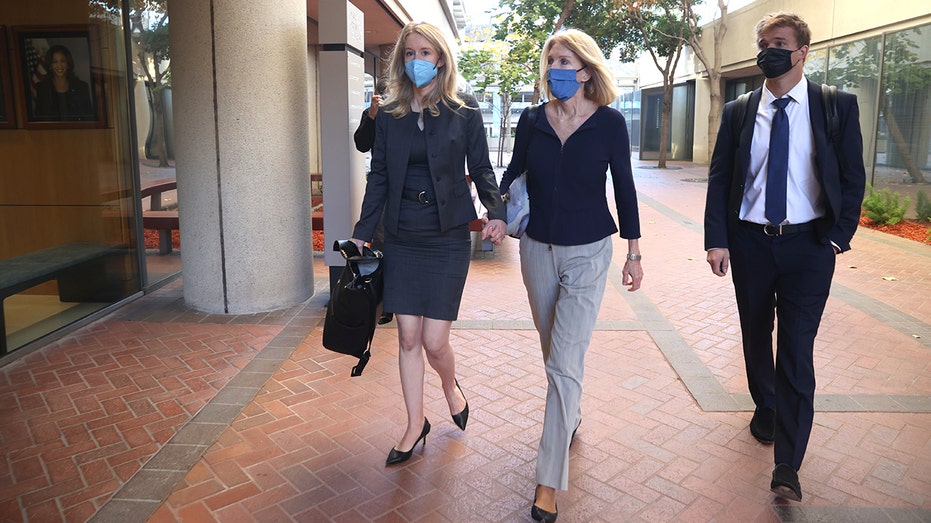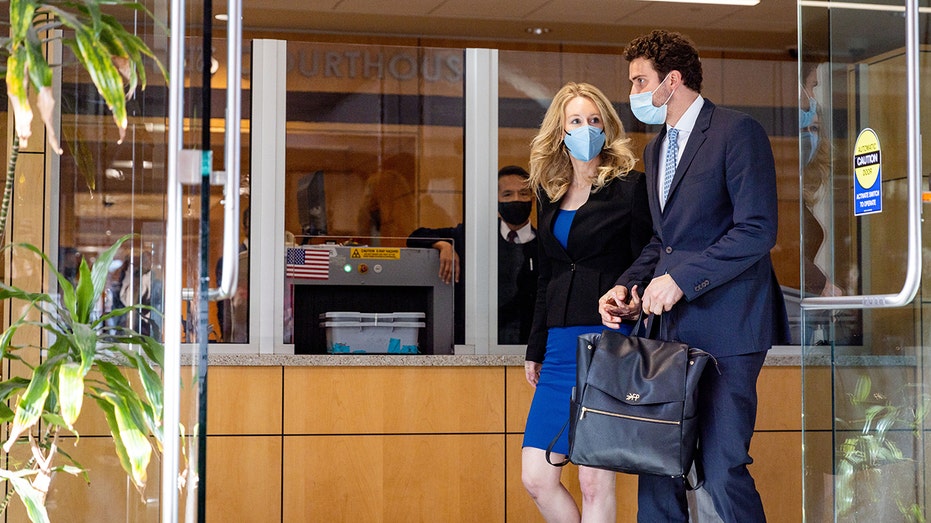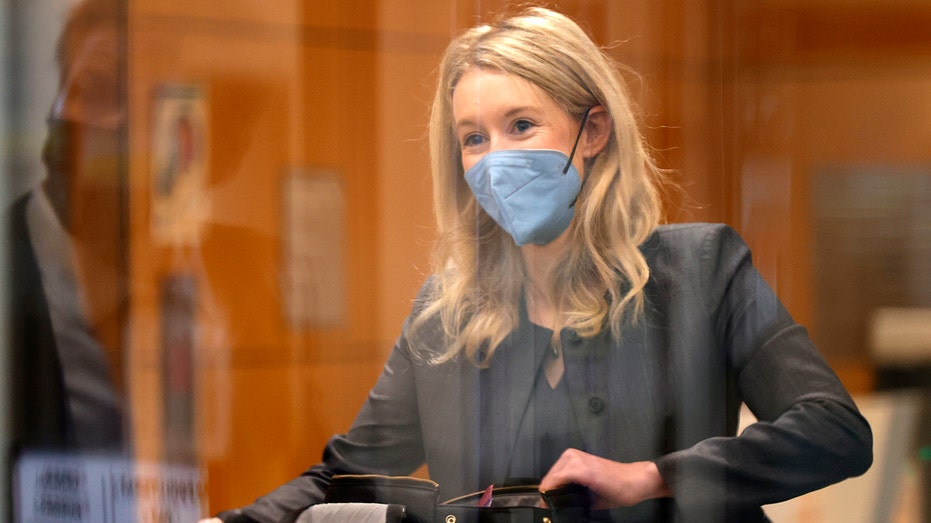Elizabeth Holmes claps back against serious allegations about Theranos
Holmes’ full day of testimony was her longest yet
Fox Business Flash top headlines for November 23
Check out what's clicking on FoxBusiness.com.
For the first time in her criminal-fraud trial, Elizabeth Holmes on Tuesday took aim at the most serious allegations made against her by prosecutors, offering a narrative of herself as a well-intentioned if inexperienced entrepreneur who had some success in her effort to transform healthcare.
Ms. Holmes’s full day of testimony was her longest yet in her defense against 11 charges of fraud and conspiracy relating to her time running defunct startup Theranos Inc., which collapsed in 2018. It followed 11 weeks of testimony supporting the prosecution’s case that Ms. Holmes ran into trouble trying to build her blood-testing company and knowingly misled investors and patients about her technology’s capabilities.
Her testimony Tuesday, her third day on the witness stand, sought to pick apart what lawyers following the trial have deemed the prosecution’s strongest evidence.
ELIZABETH HOLMES DENIES DECEPTION AT HER CRIMINAL TRIAL

Theranos founder and former CEO Elizabeth Holmes (L) walks with her mother, Noel Holmes, as they arrive for Elizabeth Holmes' trial at the Robert F. Peckham Federal Building on Nov. 17, 2021, in San Jose, California. (Justin Sullivan/Getty Images / Getty Images)
Ms. Holmes told the jury that she added the logos of major pharmaceutical companies to Theranos documents with honest intentions; that she didn’t try to avert regulatory oversight but was transparent with the Food and Drug Administration; and that Theranos turned to using commercial blood analyzers to deal with higher blood-sample volumes caused by a retail partner’s decision, not because it was trying to mislead anyone about what its own devices could do.
While on the stand, Ms. Holmes looked intently at her lawyer and flashed an occasional smile. During breaks, she tightly embraced her partner, mother and friends who had come to support her.
Ms. Holmes faces a maximum of 20 years in prison for each fraud count. The case appears to be heading toward a conclusion, as the defendant is traditionally the last witness to be called in criminal trials. Prosecutors will have the opportunity to cross-examine her and offer a rebuttal after the defense rests its case.
Ms. Holmes said Theranos started using commercial blood analyzers after it changed its business model to accommodate a request in 2012 from Walgreens Boots Alliance Inc., which had a partnership with Theranos.
But Theranos continued to claim it could run more than 200 tests on a small amount of blood from a finger prick using its proprietary device. Evidence from the prosecution has shown that it could run only about a dozen tests on its own machines—even those tests were unreliable—and for the majority it relied on commercially available machines, altering them to be able to run tests on a small sample of blood, court records and testimony have shown.
In 2015, at a conference days after The Wall Street Journal first reported on Theranos’s problems with its technology, Ms. Holmes insisted: "We have never used commercially available lab equipment for finger-stick based tests."

Theranos founder and former CEO Elizabeth Holmes along with her partner Billy Evans (R) depart the Robert F. Peckham Federal Building on Nov. 22, 2021, in San Jose, California. (Ethan Swope/Getty Images / Getty Images)
In her court testimony, Ms. Holmes said that after Theranos and Walgreens struck an agreement to put Theranos devices in its drugstores to offer customers on-site blood tests, Walgreens changed its mind and asked Theranos to instead run the tests at its own lab. Eventually, blood samples flooded into Theranos, and the company was ill-prepared.
It became impractical to test hundreds of samples on its proprietary devices, Ms. Holmes said, since each machine could run only one sample at a time, so Theranos bought commercial analyzers and modified them to work with the small samples of blood it collected.
"This made a lot more sense," she testified, because "you could process all those samples at the same time."
A spokesman for Walgreens declined to comment. A former Walgreens official involved in the partnership disputed Ms. Holmes’s account in an interview Tuesday, saying the companies agreed to the new arrangement after Walgreens lawyers rejected the startup’s theory that its devices could be used in drugstores without regulatory oversight.
Ms. Holmes said Theranos told the FDA about the change to lab-based testing, but told no one else, including Walgreens, because it was a trade secret.
Ms. Holmes sought to show that Theranos was transparent with the FDA about all relevant aspects of its business, including in 2013 initiating the process to get regulatory approval for its blood-testing machine. She said Theranos shared with the FDA videos that recorded the inner workings of Theranos’s devices and the tests happening in real time.
"I believed it was ready to get FDA approval," Ms. Holmes said of Theranos’s technology in 2013.
When the FDA inspected Theranos’s labs in 2015, the agency declared its proprietary device for collecting small blood samples "uncleared," effectively banning their use and forcing Theranos to abandon its signature blood-collecting method. Theranos in 2016 withdrew an FDA request for emergency clearance of a blood test after the regulator found Theranos had failed to implement patient safeguards while studying the new test.
Ms. Holmes confirmed that she added the logos of Pfizer Inc. PFE -0.23% and Schering-Plough Corp. MRK 1.42% to Theranos documents, which were shared with investors. She testified that she thought at the time that using the logos was appropriate because the work discussed in the documents was performed with those pharmaceutical companies.
CLICK HERE TO READ MORE ON FOX BUSINESS

Theranos founder and former CEO Elizabeth Holmes goes through a security checkpoint as she arrives for her trial at the Robert F. Peckham Federal Building on Nov. 17, 2021, in San Jose, California. (Justin Sullivan/Getty Images / Getty Images)
Walgreens executives and a number of investors received the documents emblazoned with the Pfizer and Schering-Plough logos and testified that they understood that to mean the pharmaceutical companies validated Theranos’s technology.
Asked by her attorney Kevin Downey if she was trying to mislead anyone about the nature of Theranos’s relationship with the pharmaceutical giants, Ms. Holmes said that wasn’t the case.
"But I’ve heard that testimony in this case and I wish I had done it differently," Ms. Holmes testified.
Theranos had conducted studies with Schering-Plough and Pfizer to demonstrate the performance of its devices. Scientists from both companies testified for the government that they were unimpressed with Theranos and determined that their employers shouldn’t work with the startup. They disagreed with Theranos’s claims about its technology and the logos were added without their permission, they said.
CLICK HERE TO GET FOX BUSINESS ON THE GO
Ms. Holmes offered a different take. "This work was done in partnership with those companies and I was trying to convey that," she said. The results from the study with Pfizer were particularly exciting, she said, and she wanted Walgreens and other investors to know about them.
"’The devices worked and I thought the data was really good and I wanted to share it with them," she testified.
This article first appeared in the Wall Street Journal




















